- Home
- Madeleine L'engle
Camilla Page 16
Camilla Read online
Page 16
I shook my head.
“Very rare quality in a woman,” he said, “the ability to keep quiet when you have nothing to say. Is she always like that, Frank? Or is it just my influence?”
“She’s always like that,” Frank said.
Suddenly a strange look came to David’s eyes, as though he were moving far, far away from us. His eyes seemed to go back and back, and the lines cut in his face seemed all at once to grow deeper. He reached for a small box on the table by him and took out a pill. Frank got up quickly and poured him a glass of water from a pitcher that stood on the table and as David reached for it I could see that his hand was shaking. He swallowed the pill and drank some water and leaned his head back against the chair, his lids drawn tightly over his eyes. Frank waited until at last the eyes were open again, and then said, “We’d better go now, Dave.”
David smiled, but it was a difficult smile; it was as though it took a great deal of muscular power for him to pull the corners of his mouth upward; and the smile scarcely came into his eyes at all. “Okay,” he said. Then he looked at me and said slowly, with difficulty, “When will you come play . . . chess with me, Camilla? Can you . . . come tomorrow? It’s Sunday.”
I was going to a concert with my mother in the afternoon, so I said, “I could come tomorrow evening after supper.”
“All right,” David said. “Thank you.” He closed his eyes again and his voice, too, seemed to go off into the distance. Frank and I left him. As we passed what I guess must have been the living room, Frank called out good-bye to Mrs. Gauss, who had the radio turned on very low to some woman’s program as she sat there sewing. It was an odd sort of room to me, like the living rooms in some of the foreign films Luisa and I had been to, dusty and dark in color, with a round table covered by a long brown velvet throw, and a hanging lamp over it with fringe on the shade.
Mrs. Gauss came to the door with us. “Good-bye, Frank. It’s good of you to come so often.”
“I like coming,” Frank said. “This is Camilla Dickinson. I don’t think I introduced you when we came in.”
Mrs. Gauss and I both murmured how-do-you-do and good-bye and Frank and I left. We went down the elevator in silence and we walked slowly along the street and then Frank said, “You don’t mind going back tomorrow night?”
“No.”
“Did you like David?”
“Yes. I—”
“What?”
“Oh, Frank,” I said, “it’s the first time I—oh, I knew there was a war and everything, I even saw about it in the newsreels, I was scared of it, but none of it—I didn’t know. I didn’t realize. Frank, I don’t think most people do.”
When I was first getting to know Luisa I felt that she was giving me glimpses of worlds I’d never seen, almost as though she were giving me a telescope to look through at the stars; but I realized now that Frank’s telescope was much stronger than Luisa’s; or perhaps it was only that it was more suited to my eyes.
“Hungry?” Frank asked me then. “Ready for lunch?”
“Yes,” I said. “I think I am.”
“The paper says it’s going to snow tonight.”
“Good. I hope it does,” I said. “I love snow.” And I thought how wonderful it would be to walk about the streets in the snow with Frank, to feel the snow feather-soft on our faces and hands, and to walk along the quiet streets that somehow seem so much narrower, so much more intimate, during a snowfall.
We ate spaghetti in a small Italian restaurant that Frank said was owned by the parents of a friend of his, and all the time we ate we talked, talked, talked. It seemed as though if we talked forever we would never finish saying all the things we had to say to each other. After lunch we walked. We weren’t walking anywhere in particular, just wandering slowly along the streets and talking, and the sky was gray and full and heavy, and one or two flakes of snow drifted gently down.
“It’s starting to snow,” Frank said.
“Yes.”
“David doesn’t ask many people to come see him. There are one or two people who come quite often, but not many. And he doesn’t like strangers. I’m glad he liked you.”
“I am too,” I said.
Frank pulled his hand out of the pocket of his overcoat and took my hand. When he had taken my hand once in the park, other times when I had touched his fingers, it had seemed quite natural and unimportant. Now I was terribly conscious in each finger, in my palm, in every bit of the skin of my hand, of the contact between us. I could feel it somehow not just in my hand but all over me. It was such a big feeling, such a strange one, that we walked for quite a while and I hardly heard anything that Frank was saying because the feel of his hand seemed to fill my ears too.
Then I heard him still talking about David. “You know, Cam, I’ve always been terribly—proud—somehow, that David has cared enough about me to want me to come see him. I mean he—I mean, I must seem just a kid to him, and he really talks to me as though I were—” Then he broke off and looked at me and said, “Gee, Camilla, you look pretty today! That color you have on. I was noticing it at lunch. It sort of goes with your eyes . . . There’s a good movie on at the Eighth Street. Let’s go, hunh?”
We sat together in the darkness at the movies and it was a good picture, but I was too conscious of Frank sitting there beside me really to keep my mind on it. Afterward I remembered I’d promised to call Mother, so we went to a phone booth and I called my mother to tell her I was all right, and for a moment I was no longer all right because the line was busy and I was afraid she might be talking with Jacques. But when the line was cleared and I talked to her, her voice was clear and casual and I went back out to Frank and forgot about her and was with Frank, all of me. It’s a funny thing how sometimes your body can be in a room with people, but you yourself won’t really be there; you’ll be with someone else who isn’t in the room at all. But all of me was with Frank and I kept thinking, I wonder if I will ever be as happy as this again.
Then we just walked very quietly for a while, holding hands, and all about us the first real snow of the winter started to fall, dropping its soft white stars between the houses onto the street, falling so softly, so tenderly about us. All the city noises seemed muted, muffled in whiteness. The streetlamps came on, the light streaming from them in moving gold arcs. The intimacy of streets is more beautiful and comforting when it is snowing than at any other time. The snow curls around the corners, falls like silence between the houses, piles over the curb so that street and sidewalk are lost in white. I knew that by tomorrow the snowplows would have cleaned the streets, feet would have smutched the sidewalks, the remaining snow would be black and soiled; but as I walked through the evening, holding Frank’s hand, the snow was free and pure, and it seemed part of my happiness.
We went to the Stephanowskis for supper and they made me feel warm and welcome. After supper we played some new recordings Mr. Stephanowski had brought over from the shop, and then it was time to go home. I didn’t dare stay out too late.
Frank said, “Camilla, I wish I could take you home in a taxi, but I’m afraid it will have to be the subway.”
“I’d rather go in the subway anyhow,” I said.
The snow had stopped falling, though the sky was still full of snow clouds. With the snow on the ground and the heavy white clouds hanging low over the city, everything seemed touched by a strange white light, almost the way you might expect it to look on the moon.
When we got out of the subway and started walking toward the apartment house, Frank and I were suddenly very quiet, as though the talking we had been doing all day had drained us of words. I felt that I could not say another thing because now the beautiful long day was over and I knew that it had been the biggest day of my life so far. I thought that I could not bear it because the day was over and I did not know when I would see Frank again. He had said nothing and I could not ask.
Then, suddenly, in the middle of the quiet snowy street, Frank stopped and said, “Camilla.”<
br />
We stood there very still in the street and we were alone; there was no one coming in either direction; there were only dark houses on either side and the snow between. We stood there very close together, and almost without moving we seemed to become closer and Frank’s cold clean cheek was pressed against mine. We stood there with our cheeks together, cold and clean, and I felt my heart beating terribly rapidly, and I could hear Frank’s, too, a strong swift thumping against my chest.
Then without saying anything we started walking again. We walked until we got to the house and then Frank just said, “Good-bye, Camilla,” in an odd sort of way and left me.
The elevator boy leered at me and said, “Haven’t seen your boyfriend lately.”
“What?”
“Your boyfriend. Mr. Nissen.” He gave a strangling sort of giggle.
“Oh, him,” I said, and it was as though I hadn’t heard because my mind never touched even the thought of Jacques. I was still out in the snow with Frank and I thought I would die of agony because he had left me without saying anything about seeing me again.
When the door of the elevator had closed behind me I stood in the hall without pulling out my latchkey and things I had not noticed during the day came back to me: David’s saying that I was the nicest of the girls Frank had brought to see him. Who were the other girls? What about Pompilia Riccioli? Luisa had said that Frank liked girls. Perhaps I was just one of dozens of girls Frank liked for a day and then dropped in favor of someone else.
But then I thought, No. I couldn’t have been as happy as I was all day if it hadn’t meant something to Frank too.
That night I dreamed a dream. I dreamed that I was standing on a cold and snowy plateau somewhere at the isolated edges of the world. I was standing there all alone, and all about me the snow was falling. No matter in which direction I turned I could see nothing but snow. Snow on the ground, snow in the sky, snow falling in the air about me. And I knew that I was terribly frightened and terribly alone. Then, out of nowhere, Frank was standing beside me. He said, “Camilla,” the way he had said it on the snowy sidewalk, and then he took me and held me tightly in his arms and kissed me. When he kissed me in this dream all the snow melted away and we were standing in a green field filled with flowers, with tulips and narcissi and daffodils and irises, with all the flowers that had had the courage to push up through the snow, knowing that spring would be there.
Then I woke up. I didn’t know what time it was, but it couldn’t have been terribly late, because there were still lights on across the court. And suddenly, for no reason that I could explain, I flung around on my pillow and began to sob. I sobbed and sobbed and I couldn’t stop and I was terribly afraid that Mother or Father would hear. I pressed my face into the pillow and finally the sobs stopped coming. But there remained an awful aching in my body and all I wanted in the world was to be standing out on the snowy street again, close to Frank, with my cheek against his.
Then I thought about his kissing me in the dream, and I tried to imagine what it would be like if he really kissed me, and I knew that I wanted him to kiss me more than anything in the world.
The next morning at first I didn’t remember the dream. I got up and took off my pajamas and stood in front of the long mirror on my door looking at myself almost in the same way I had looked at myself on that morning of my birthday when I had first realized I was Camilla Dickinson. I stood there naked and looking at myself until I began to shiver, and then I dressed and went into Mother’s room; and I was able to put my arms around her as she lay in bed waiting for her breakfast tray, and kiss her, and say, “Good morning, Mother.”
Her arms went around me terribly quickly, terribly gladly, and she said, “Oh, good morning, my darling, my darling, good morning.”
My father was standing in front of his mirror tying his tie, and I said, “Good morning, Father.”
He smiled at me. “We seem to have our old Camilla back.”
Oh, no, I wanted to tell him. This is a new Camilla, an entirely different Camilla.
But I just said, “Well, I think I’ll go call Luisa.”
“Oh?” my father said. “Does that mean Luisa or her brother?”
“It means Luisa,” I said. “I thought maybe I’d go down to see her this morning.”
“I see,” my father said. “Well, I’m delighted that you’ve decided to consult us about it this time, at any rate.”
“Don’t, Raff,” my mother said quickly. “Don’t take your bad mood out on Camilla.”
“Are you in a bad mood, Father?” I asked.
“Your mother says I am.”
“Camilla darling, I’m so glad you enjoyed—” my mother said. “Frank must be a nice boy to have given you such a happy day yesterday.”
“Yes.” I thought of the day and I was excited and happy. And I was frightened because I was afraid there might never be another like it.
“I don’t like your being out alone so late at night,” my father said.
“I wasn’t alone. I was with Frank.”
“Frank’s just a child.”
“Frank is seventeen,” I said. “Next year he’s going to college.”
“Oh, let her enjoy herself these last few weeks, Rafferty,” my mother said.
My father gave a start of annoyance. I was suddenly very frightened. “What did you mean, ‘these last few weeks’?” I asked.
“Camilla, oh, darling,” my mother said, “your father and I have—I’m sure it’s the best thing for you, the very best— we’ve talked and talked about it.”
“About what?” I asked.
My father turned around and looked at me. “Camilla, I’m going out now. I wish there were time for us to have a talk before I go but there isn’t. I’ll have to talk to you when I get back.”
“I want to know what it is now!” I cried, and there was panic in my heart.
“I haven’t time to talk to you now, dear,” my father said. “I’ll be back for supper and I’ll talk to you then.”
“I’m going out right after supper,” I said. “Please, Father, what is it?”
“Who are you going out with after supper?” my father asked. “Luisa? Or Frank?”
“I’m going to see David,” I said. “David Gauss. I promised I’d play chess with him.”
“Camilla, really,” my father said. “You pick the most inconvenient times— Who on earth is David Gauss? Where did you meet him and why are you playing chess with him?”
“Raff, go on.” Mother sat up in bed and frowned anxiously. “I’ll talk to Camilla.”
“I intend to wait long enough to learn who David Gauss is,” Father said.
“He’s a veteran,” I cried. “He lost both his legs in the war. Frank took me to see him yesterday. He can’t ever walk again and he has no one to play chess with and I know how to play.”
“Oh,” Father said, and he sounded less irritable and excited. “I see. Where does he live?”
“On Perry Street.”
“In the Village?”
“Yes.”
“He certainly doesn’t expect you to go all the way down to Perry Street alone and back at night, does he?” Father asked.
I began to feel angry. “I don’t think he thought about it. He doesn’t know where I live.”
“I’m sorry, Camilla,” Father said, “but I can’t allow you to make that trip alone at night.”
“I’ve been to Luisa’s alone.”
“Not with my knowledge.”
“I have to go,” I said. “I promised.”
“I’m sorry, Camilla,” Father said again. “I forbid you to go there alone, and that’s final.”
“Perhaps Carter could take her down,” Mother suggested.
“Carter goes off on Sunday evening.”
“Father,” I said, “David was in the war. He lost both his legs. I promised him. I have to keep my promise.”
My father opened his mouth to speak again and the telephone rang. Mother answered it. “He
llo? . . .” She held the receiver out to me. “It’s for you, darling. I think it’s Frank.”
It was. “Hi, Cam,” he said. “Listen, about your going to see David tonight. Do you want me to take you?”
It was as though somehow he had heard the conversation between me and my parents and was coming to my rescue. “Oh, Frank, that would be wonderful!” I cried.
“Well, listen,” he said, “if it’s okay with your mother I’ll pick you up at Carnegie after your concert and we’ll go out and get something to eat and then I’ll take you over to David’s and bring you home.”
“Oh, Frank, that would be wonderful,” I said again. “Wait a minute and I’ll ask Father.” I turned to my father. “Father,” I said, “Frank says he’ll take me to David’s and bring me home.”
“Will he call for you here?” Father asked.
“He wants me to have supper with him,” I said. “He’ll pick me up at Carnegie after the concert and then he’ll take me to David’s and bring me home.”
“Very well, dear,” Father said. “This one time.”
“It’s all right,” I said to Frank. “He says it’s all right.” And I felt as though a whole sky full of birds had risen up inside me and were flying to the sun.
My father pulled me to him roughly. “I’m sorry if I’ve seemed disagreeable this morning. I’m trying to get a million and one things done in a short time and it makes me irritable. I’ll be off now.” He patted me on the shoulder and then turned to Mother and said, “I’m sorry, Rose. I’ve been a bear this morning. Forgive me.”
My mother put her arms around my father then and clung to him. The strange thing was that never before had I seen my mother do anything that I felt to be me, but now she clung to my father in the way in which I would have liked to cling to Frank. I moved over to the window because I felt that perhaps I shouldn’t be looking.

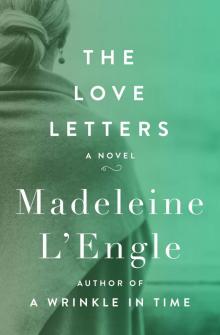 Love Letters
Love Letters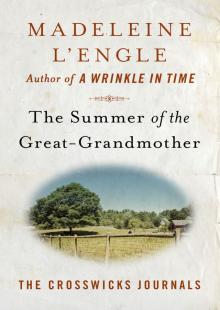 The Summer of the Great-Grandmother
The Summer of the Great-Grandmother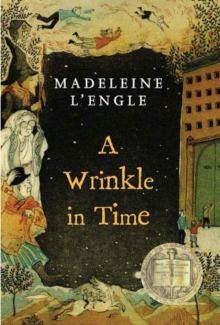 A Wrinkle in Time
A Wrinkle in Time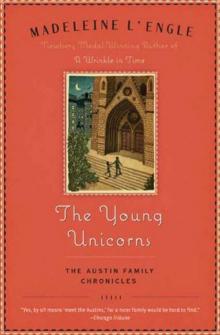 The Young Unicorns
The Young Unicorns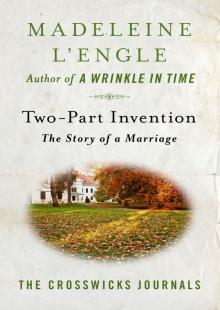 Two-Part Invention: The Story of a Marriage
Two-Part Invention: The Story of a Marriage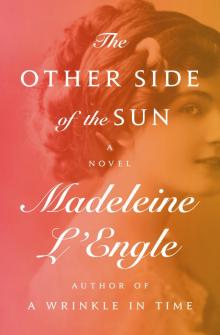 The Other Side of the Sun
The Other Side of the Sun A House Like a Lotus
A House Like a Lotus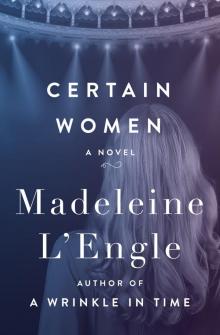 Certain Women
Certain Women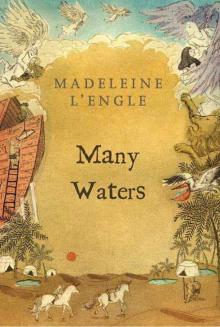 Many Waters
Many Waters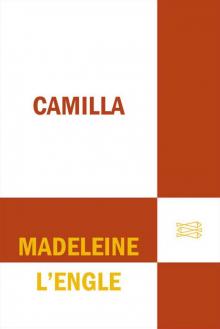 Camilla
Camilla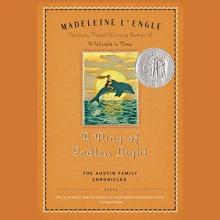 A Ring of Endless Light
A Ring of Endless Light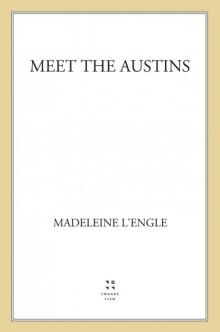 Meet the Austins
Meet the Austins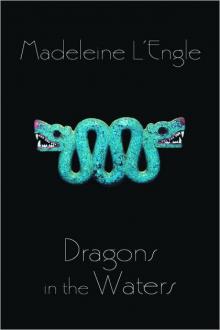 Dragons in the Waters
Dragons in the Waters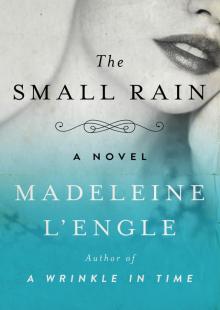 The Small Rain
The Small Rain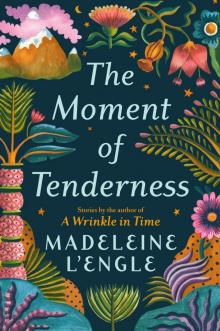 The Moment of Tenderness
The Moment of Tenderness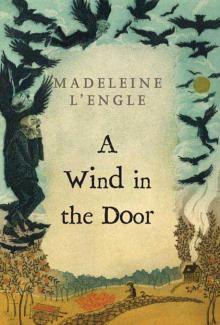 A Wind in the Door
A Wind in the Door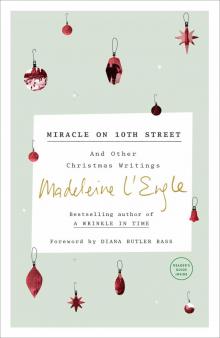 Miracle on 10th Street
Miracle on 10th Street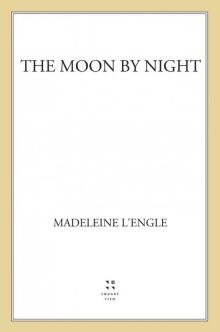 The Moon by Night
The Moon by Night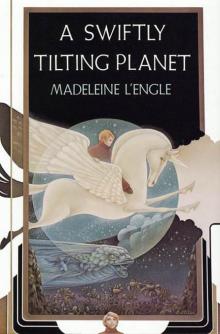 A Swiftly Tilting Planet
A Swiftly Tilting Planet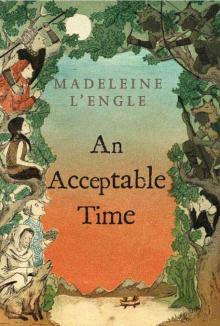 An Acceptable Time
An Acceptable Time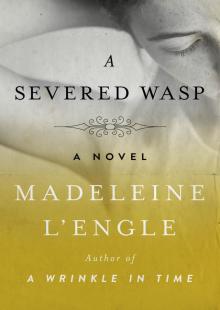 A Severed Wasp
A Severed Wasp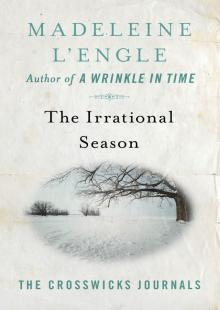 The Irrational Season
The Irrational Season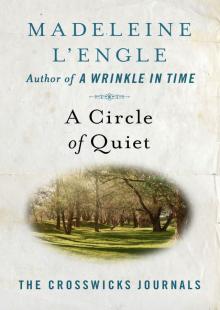 A Circle of Quiet
A Circle of Quiet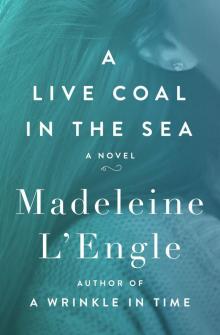 A Live Coal in the Sea
A Live Coal in the Sea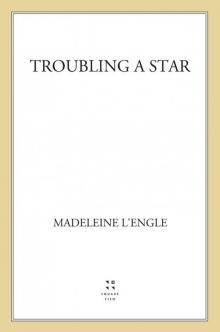 Troubling a Star
Troubling a Star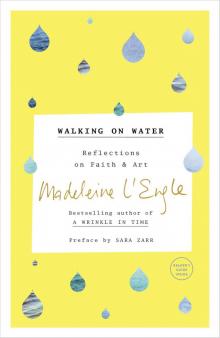 Walking on Water: Reflections on Faith and Art
Walking on Water: Reflections on Faith and Art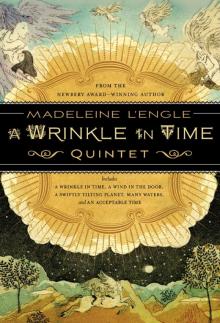 A Wrinkle in Time Quintet
A Wrinkle in Time Quintet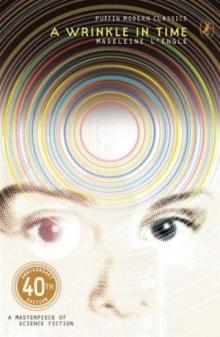 Wrinkle in Time
Wrinkle in Time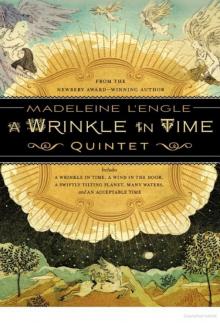 The Wrinkle in Time Quintet
The Wrinkle in Time Quintet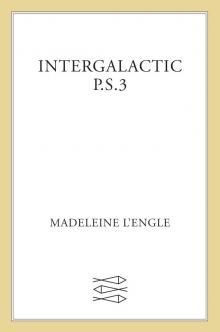 Intergalactic P.S. 3
Intergalactic P.S. 3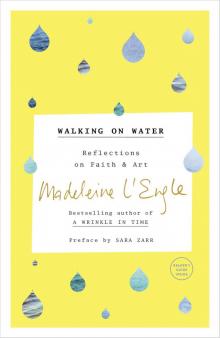 Walking on Water
Walking on Water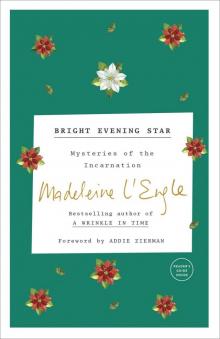 Bright Evening Star
Bright Evening Star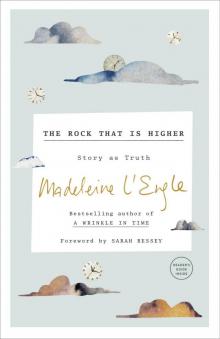 The Rock That Is Higher
The Rock That Is Higher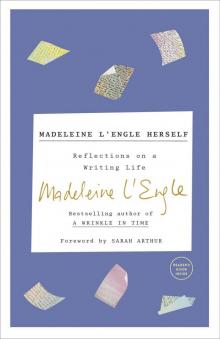 Madeleine L'Engle Herself
Madeleine L'Engle Herself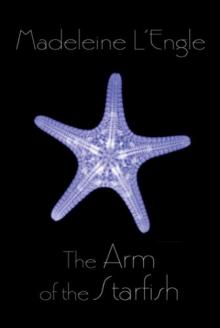 The Arm of the Starfish
The Arm of the Starfish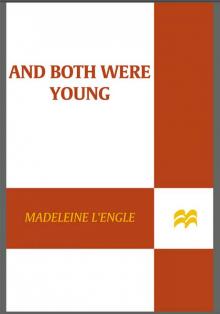 And Both Were Young
And Both Were Young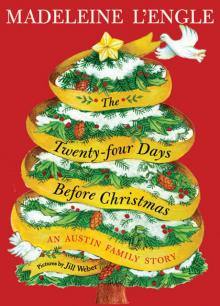 The Twenty-four Days Before Christmas
The Twenty-four Days Before Christmas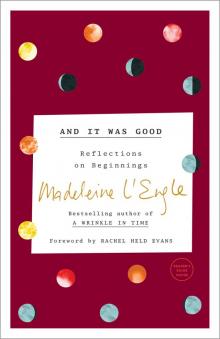 And It Was Good
And It Was Good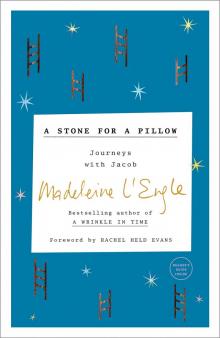 A Stone for a Pillow
A Stone for a Pillow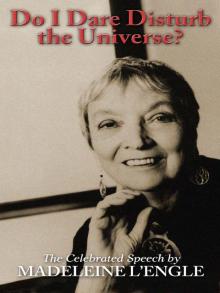 Do I Dare Disturb the Universe?
Do I Dare Disturb the Universe?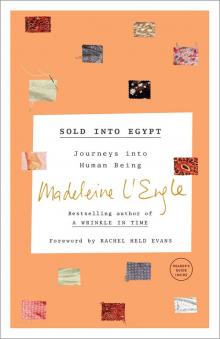 Sold into Egypt
Sold into Egypt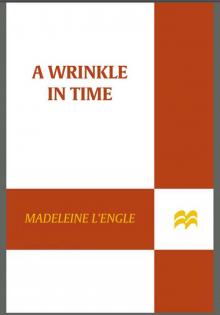 A Wrinkle in Time (Madeleine L'Engle's Time Quintet)
A Wrinkle in Time (Madeleine L'Engle's Time Quintet)